Smart food storage during the Tet holidays will help your family enjoy delicious meals while ensuring health.
Ways to Store Food During Tet and Mistakes to Avoid
1. Bánh Chưng
After boiling, remove the bánh chưng and rinse it with cold water to remove excess starch, then let it drain. Next, stack the bánh chưng in layers and place a weight on top for a few hours to help the moisture escape.
Then, just keep the bánh chưng in a dry, dust-free, and low-humidity place to extend its shelf life.
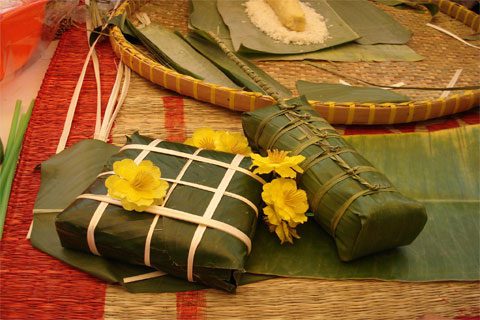
Bánh chưng should be stored in a dry, dust-free, and low-humidity place.
Some believe bánh chưng should not be stored in the refrigerator as it may harden. However, if the weather is hot, you can store it in the refrigerator, cutting off portions as needed, and wrapping the remaining pieces tightly with food film.
Note that when taking bánh chưng out of the refrigerator, it needs to be boiled, steamed, or fried before consumption. Frying should be limited as it increases the fat content in your daily diet, which is not beneficial for health.
If you notice any white mold or sour fermentation (especially at the corners where the wrapping may tear), cut off the affected areas and only use the parts that are still aromatic.
2. Giò Chả
To store giò chả, remove all outer packaging to prevent sweating. It is best to cover it with a basket that has small holes for ventilation, but avoid drafts.
The storage method for giò lụa, giò bò, and chả is similar, keeping them at room temperature below 25 degrees Celsius.
When stored correctly, giò can last 4-6 days in the refrigerator, and up to 10 days in the freezer if you’ve bought too much.
When ready to use giò lụa from the freezer, let it sit at room temperature for about 4 hours or transfer it to the refrigerator 8 hours beforehand.
Be cautious of cracks, as the fatty acids may ferment, resulting in sour smells, indicating spoilage.
Watch out for preservatives and salt content in processed foods. These foods are often cooked or salted for sterilization, which can increase their shelf life but may be harmful to health due to high salt and preservative levels. To reduce these, choose products from reputable brands, paying attention to ingredients, nutritional value, usage instructions, storage methods, expiration dates, and manufacturers.
Foods like cheese, sausages, pâté, and canned meats are high in animal fats, cholesterol, and salt, which are not advisable for those with high cholesterol, hypertension, atherosclerosis, or diabetes, so their consumption should be limited.
3. Frozen Meat
Frozen meat is enjoyed with hot rice, dipped in pure fish sauce with lime and chili, and served with pickled onions and scallions… This dish is popular during Tet and throughout the year.
For this dish, it’s best to divide it into small portions for each meal to store in the refrigerator, preserving its unique flavor and extending its shelf life.
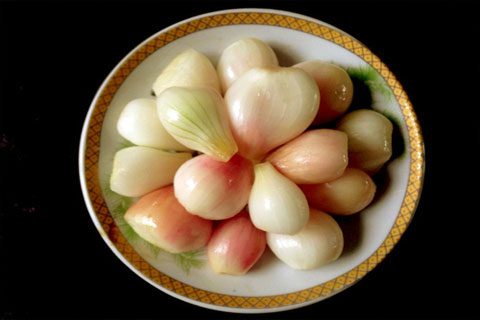
Scallions need to be washed clean and thoroughly dried.
4. Pickled Onions and Scallions
When cutting the roots, be careful not to cut into the bulb. After washing, let the bulbs dry thoroughly; otherwise, they can spoil easily. Boil the pickling water thoroughly. The salt content should be just right—not too bland—so that it can last longer without developing a film on the surface. You can also sun-dry the jar of pickled onions to make them crisper and preserve them for longer.
5. Various Candies
Candies often contain a lot of sugar, making them prone to melting and molding. To store candies for a longer time, place them in jars or plastic bags, covering them with a layer of sugar on top (to absorb moisture) and seal tightly.
When consuming, only take out a small amount to avoid putting leftover candy back into the original bag or jar. For this type of food, avoid refrigeration as it will absorb moisture when taken out, promoting mold growth.
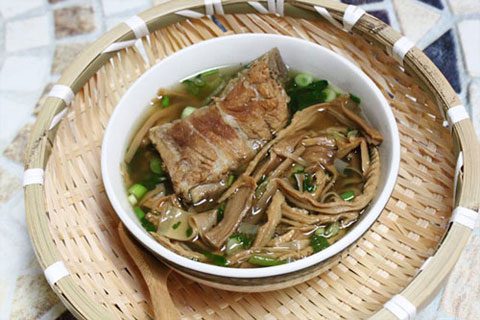
Only soak bamboo shoots in small amounts, just enough for safety.
6. Storing Dried Foods
If you want to store bamboo shoots for a long time, boil them in water for about 30 minutes, keep the heat low, then remove and cut off the tough parts, and rinse clean.
Use rice water or cooled boiled water for soaking, changing the water every 2-3 days. However, for safety, only soak small amounts to eat within 2-3 days, and cook more as needed.
For dried foods like mushrooms, wood ear mushrooms, nuts, and beans, keep them separate, placing each type in plastic bags, sealing them tightly with a heat sealer, or storing them in food containers in a dry, cool place. When using, avoid letting these foods get wet, as moisture can lead to mold or fermentation.
7. Fresh Ingredients
Fresh meat and fish should be stored in the freezer to keep them for longer. Clean them before placing them in containers or plastic bags, sealing them tightly, and storing them in the freezer.
When you need to prepare a dish, thaw the ingredients and use them. After thawing, cook all the food.
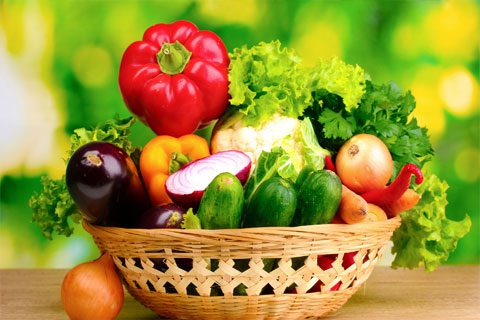
Fresh ingredients must be cleaned before storage.
8. Vegetables and Fruits
When buying vegetables and fruits, select products that are fresh, with natural colors, and free from bruises, wilting, or unusual smells…
After purchasing vegetables and fruits, remove any wilted parts, wash them clean, let them dry, and store them in the refrigerator. You can wrap them in newspaper or plastic bags to keep them from losing moisture and stay fresh longer.
For vegetables and fruits like cabbage, napa cabbage, tomatoes, carrots, and potatoes… you can keep them in a cool, ventilated place without necessarily refrigerating them. In this case, don’t wash them until you are ready to cook.
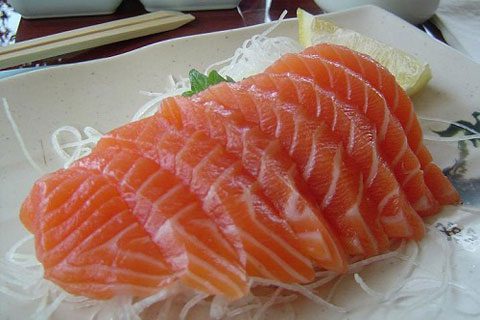
Fresh meat and fish should be stored in the freezer to keep them for longer.
9. Cooked Foods
Cooked foods should be cooled before placing them in the refrigerator. This is important because putting hot food in the refrigerator can alter its quality, cause moisture condensation, harm other foods, and negatively affect health when consumed.
Store cooked food in sealed containers to prevent contamination from raw foods.
10. Quick Thawing Methods
If you need to thaw quickly, you can use the microwave. This method is effective because the high-frequency electric field creates internal friction within the food, warming it up and thawing it without rupturing the cells.
If you don’t have a microwave, use cold water mixed with a little salt to thaw quickly.
Note: Do not overcrowd the refrigerator with food, as the cold will not distribute evenly among the items, resulting in less effective preservation.
11. How to Safely Store Food
According to the Food Safety Department of Ho Chi Minh City, the meals during the Lunar New Year are always more elaborate than usual. For homemakers, preparing food for the holiday is no longer a strange task. The refrigerator has become a “magical cabinet” for preserving all types of foods, from raw meat, cooked dishes, vegetables, to cakes…
However, improper food storage in the refrigerator can lead to cross-contamination between raw and cooked foods. Additionally, keeping food in the refrigerator for extended periods can decrease its freshness and nutritional content.
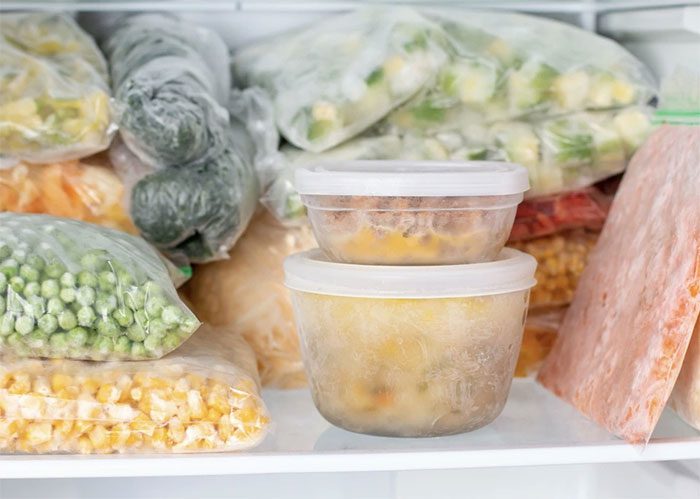
Homemakers often stockpile food in the refrigerator to save time shopping, especially during the Lunar New Year. (Photo illustration: Foodscinotes).
In today’s modern trend, most markets or supermarkets open very early, making it easier for people to shop for food. Therefore, we should only:
- Stock enough food for 3-4 days of the holiday.
- Choose food with clear origins, reputable sources, and meet sensory standards for taste and appearance.
Store food scientifically and correctly according to the guidelines of the Food Safety Authority – Ministry of Health:
- Classify food before storage.
- Store each type of food intelligently.
Limiting the storage of too much food in the refrigerator not only reduces the decline in food quality but also minimizes the risk of food poisoning during the holiday.
12. Avoid the Mindset of “Abundant Feasts” During the Lunar New Year
According to Dr. Le Thi Hai, former Director of the Nutrition Examination Center at the National Institute of Nutrition, we should change our perception of eating during the Lunar New Year and avoid the mindset of cooking “abundant feasts.”
Everyone should maintain a moderate diet, increase the intake of vegetables, consume adequate protein, and drink enough water to maintain a healthy digestive system. Additionally, it is important to avoid cooking too much food that may not be consumed, as this leads to storage from one day to the next, reheating, which does not ensure food safety and can be harmful to health.
By storing food scientifically and maintaining a balanced, healthy diet, we can create a healthy body, making the joy of celebrating the Lunar New Year even more fulfilling.




















































